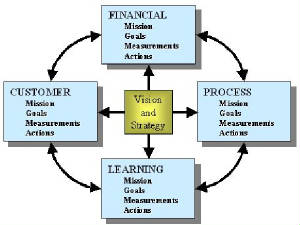The Balanced Scorecard
"Improving Business Performance" The balanced scorecard is a management system (not only a measurement
system) that enables organizations to clarify their vision and strategy and translate them into action. It provides feedback
around both the internal business processes and external outcomes in order to continuously improve strategic performance and
results. When fully deployed, the balanced scorecard transforms strategic planning from an academic exercise into the nerve
center of an enterprise.
Kaplan and Norton describe the innovation of the balanced scorecard
as follows:
"The balanced scorecard
retains traditional financial measures. But financial measures tell the story of past events, an adequate story for industrial
age companies for which investments in long-term capabilities and customer relationships were not critical for success. These
financial measures are inadequate, however, for guiding and evaluating the journey that information age companies must make
to create future value through investment in customers, suppliers, employees, processes, technology, and innovation."

The balanced scorecard methodology builds on
some key concepts of previous management ideas such as Total Quality Management (TQM), including customer-defined quality,
continuous improvement, employee empowerment, and -- primarily -- measurement-based management and feedback. A performance measurement system such as the Balanced Scorecard allows an agency
to align its strategic activities to the strategic plan. It permits -- often for the first time -- real deployment and implementation
of the strategy on a continuous basis. With it, an agency can get feedback needed to guide the planning efforts. Without it,
you are 'flying blind'.
|
